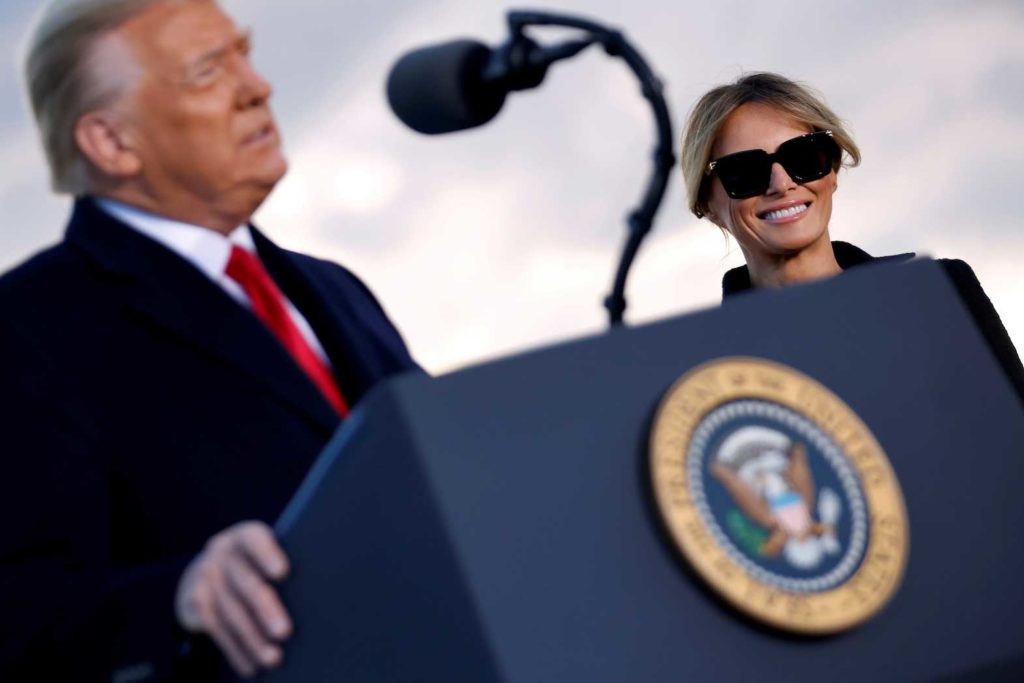With no self-pardon, private citizen Trump has iffy legal future

Outgoing first lady Melania Trump smiles as U.S. President Donald Trump delivers remarks during this last speech as president at Joint Base Andrews, Maryland, U.S., January 20, 2021. REUTERS/Carlos Barria
Donald Trump issued a list of pardons during his final hours as U.S. president but did not include himself, his children, or personal lawyer Rudy Giuliani, even though advisers said he had privately debated the extraordinary step of a self-pardon.
Here is how the decision could impact his potential civil and criminal liability as a private citizen:
What may have guided Trump’s decision not to pardon himself and members of his inner circle?
Presidential pardons can only accomplish so much. They can shut down prosecutions by the U.S. Department of Justice, a federal agency. But investigations brought by state-level prosecutors, such as the criminal probe Manhattan District Attorney Cyrus Vance is leading into whether Trump’s businesses engaged in fraud, would still be active.
Vance has not charged anyone with criminal wrongdoing and Trump has said the investigation is politically motivated.
A self-pardon would have only increased calls to prosecute Trump on a state level, said Daniel R. Alonso, a lawyer at the Buckley firm and Vance’s former deputy in the Manhattan District Attorney’s Office.
It could also have fueled efforts to hold Trump accountable through civil lawsuits brought by private litigants, such as family members of people who died during the Jan. 6 storming of the U.S. Capitol by Trump followers, said Jessica Levinson, a professor at Loyola Law School in Los Angeles.
Before the attack, as lawmakers were certifying Democrat Joe Biden’s Nov. 3 election victory, Republican Trump took to a stage near the White House and exhorted a crowd of supporters repeatedly to “fight” – using the word more than 20 times – and “not take it any longer.” He also called on his followers to march on the Capitol, the seat of government.
“With a pardon comes at least the veneer of an admission of guilty,” said Levinson. “In a way, I think pardoning himself and his family is almost like a taunt. It would have said ‘try to come and get me,’ and would have accelerated litigation and investigation.”
There is also considerable doubt among scholars about whether a self-pardon would hold up in court. Many experts said it violates the basic principle that no person should be the judge in his or her own case.
Self-serving pardons might also have drawn the ire of Republicans in the U.S. Senate, who will soon have a trial to determine whether Trump’s Jan. 6 speech was incitement, the charge in his impeachment by the House of Representatives.
The trial could result in Trump being disqualified from future office.
Would a pardon for Giuliani have helped Trump?
The answer is likely yes, though hard to speculate, legal experts said.
Giuliani had dealings with Ukrainians on Trump’s behalf when he was trying to dig up dirt on Biden and his son Hunter Biden. Trump’s efforts led to his first impeachment by the House in December 2019 and the Republican-majority Senate acquitted him in February 2020.
In November 2019, federal prosecutors in New York sought records of payments to Giuliani as part of an active criminal investigation, according to a grand jury subpoena seen by Reuters.
Prosecutors were investigating money laundering, wire fraud, campaign finance violations, making false statements, obstruction of justice, and violations of the Foreign Agents Registration Act, according to the subpoena.
Giuliani has denied any wrongdoing.
The scope and status of the investigation is unclear, and Giuliani has not been charged with wrongdoing. It is also unclear if he knows anything about Trump that would be valuable to prosecutors.
But not receiving a pardon makes it more likely that Giuliani would cooperate with prosecutors and implicate Trump if charged, said Jessica Roth, a professor at the Benjamin N. Cardozo School of Law and a former federal prosecutor.
“Without the possibility of a pardon, the prospect of a conviction and potential prison sentence becomes more real, providing an incentive to cooperate to receive more favorable treatment,” Roth said.
Trump may have decided against pardoning Giuliani because he lost a series of lawsuits brought on behalf of Trump attempting to invalidate Biden as the election winner, Levinson said.
Could Trump have pardoned himself and others in secret?
It’s possible, said former prosecutor Alonso.
Pardons are usually made public. But the Constitution does not require this, and Trump could secretly issue preemptive pardons to family members and associates, or even himself, said Alonso.
The Presidential Records Act requires documentation of presidential decisions but the law lacks a mechanism for enforcing it, Alonso said. A secret pardon might only become public if the recipient were eventually charged with a federal crime and invoked the pardon as a defense.
Want stories like this delivered straight to your inbox? Stay informed. Stay ahead. Subscribe to InqMORNING

